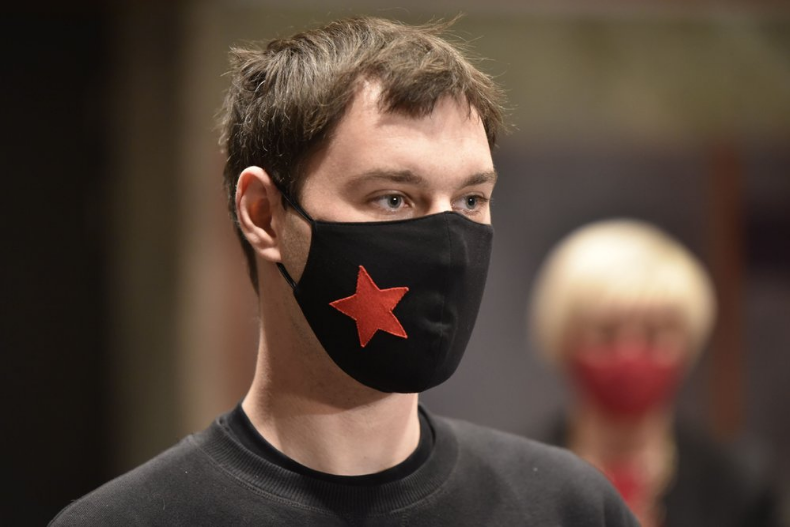Dr Vinko Gorenak, State Secretary in the Office of the Prime Minister, explained the importance of the SDS resolution for the party’s June congress on the show Tema dneva (Topic of the Day). He pointed out that this is not a call for the civil war, but only a document that points out the unacceptable social phenomena we have witnessed in the last year, such as the burning of chairs or puppets and the calls for death. He noted that the protests only take place when Janša’s government is in power. “This is about someone wanting to take power, even in a violent manner, if necessary. But power changes in elections and with the will of the people, which is reflected in the National Assembly. This is the basis of democracy, and the street cannot be the one to dictate the pace,” Gorenak explained.
The SDS party’s resolution for the June congress has been strongly condemned by the “Constitutional Arch Coalition” parties of the opposition, which claim it is absurd, dangerous and worrying. “Unfortunately, we seem to live in a country in which the Prime Minister and his party are trying to paint the world as if it is turned upside down,” the coordinator of the Levica party, Luka Mesec, believes. Meanwhile, the president of the LMŠ party, Marjan Šarec, added that talking about the possibilities of a civil war is perverse. SD president Tanja Fajon stated that with this document, Janša had indicated a very dangerous direction for the country’s future.
State Secretary in the Office of the Prime Minister, Dr Vinko Gorenak, pointed out that the resolution draws attention to certain social phenomena that are present in Slovenia. “For example, chairs made of paper were being burned in front of the building of the National Assembly, and the protesters also made it clear that next time, the real ones would be burned,” he explained.
Since 2012, there have been no protests against the government. We had them in 2012, and we have them now. “It is a kind of political mapping,” Gorenak said. He pointed out that in history, things were being burned in Slovenia as well as abroad, and what followed were some of the worst moments of the previous century. “This is about someone wanting to take power, even in a violent manner, if necessary. But power changes in elections and with the will of the people, which is reflected in the National Assembly. This is the basis of democracy, and the street cannot be the one to dictate the pace,” he explained.
The Levica party’s intentions are unconstitutional
The official documents of the Levica party (The Left) state, among other things, that they will carry out nationalisation and also that they are in favour of the so-called abolition of representative democracy. “This is a direct attack on the Constitution of the Republic of Slovenia by a political party,” Gorenak believes, as their intentions are not in line with constitutional law. “The Constitution guarantees a plural democratic system of several parties.” He notes that in the case of the Levica party, they want to end this story or are even planning a repeat of what happened in the year 1946. “When we experienced nationalisation, along with the banning of the multi-party system, that is when the Communist Party came to power.”
“If this happened in Germany, if a party with Nazi ideas appeared on their political floor, their authorities or the Constitutional Court would immediately ban it,” he explained how the Germans would react in a similar situation. He emphasised that the situation in Slovenia is slightly different and fears that there will be no proceedings initiated against the Levica party. Meanwhile, the Levica party is convinced that the SDS party is actually the one destroying the media, and they also accuse it of incitement, manipulation and intimidation. Gorenak is convinced that if the current government had such a strong influence on the national media outlet RTV, for example, then all of the editors who got to their positions during the times of the left-wing governments would have been forced to leave. “Only the Director-General of the RTV was replaced, and he is from the SMC quota, so what did we actually achieve? Nothing,” he explained, adding that they do not have the kind of influence as the others claim they do.
Elections are only possible if a Prime Minister does not have enough support
Gorenak noted that the current situation in the National Assembly is very specific, and as far as early elections are concerned, he pointed out that the situation is clear. “If we take a look at the Constitution, the matter is completely clear. If the left side wants to hold early elections, it must appoint a new Prime Minister,” he explained. If they fail to do that in three attempts, we can then have early elections. If Janez Janša resigned, that would not automatically mean that we would go to the polls. Instead, it would mean that a new attempt would be made to form a government. “We cannot go to the polls because of Janez Janša or the government’s will.” Due to all of the above, as well as the fact that protests only happen during the times of the right-wing governments, he is convinced that someone is anticipating some kind of violence against the National Assembly happening soon. “And these are the beginnings of a possible violent takeover of power, which is what we drew attention to in our resolution,” Gorenak emphasised at the end of the interview. “Power changes in the elections, according to the will of the electorate; that is the basis of democracy.”
Sara Rančigaj


